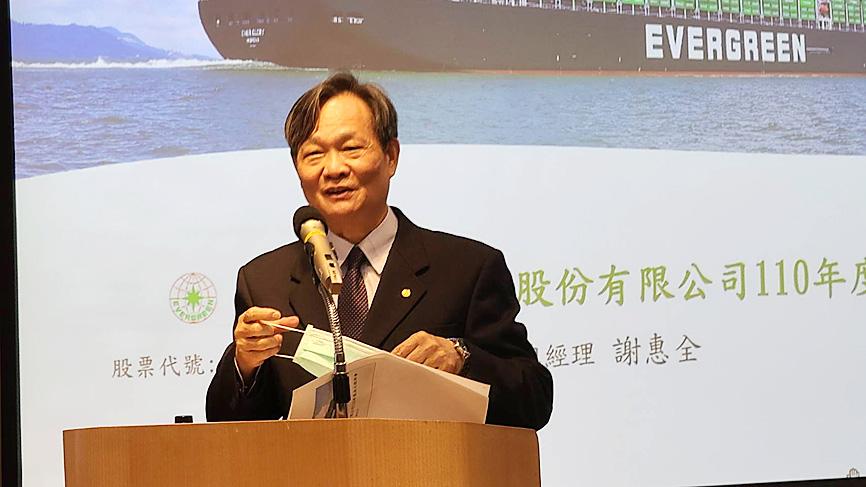Evergreen Marine Corp (長榮海運) is to continue using “megaships” — vessels with more than 20,000 twenty-foot equivalent units (TEU) of capacity — on its European routes, despite a Suez Canal incident, the container shipper said yesterday.
Evergreen Marine uses two kinds of vessels on its Europe routes, six with capacity of 14,000 TEUs and 11 with 20,000 TEUs.
The MV Ever Given, a 20,000 TEU Panama-flagged ship, last month blocked the canal for six days after becoming lodged on a bank.

Photo: Wang Yi-hung, Taipei Times
All of its 20,000 TEU vessels are owned by Japan-based Shoei Risen Kaisha Ltd, Evergreen Marine told an investors’ conference in Taipei, adding that it has chartered the Ever Given.
Evergreen Marine president Eric Hsieh (謝惠全) said that the company would not only continue using the 11 megavessels on routes from Asia to Europe, but would also replace its 14,000 TEU vessels with new 24,000 TEU vessels within the next few years in a bid to boost efficiency.
“If we continue using the 14,000 TEU ships in Europe, we will get beaten, as our rivals use bigger vessels,” Hsieh said. “Changing to 24,000 TEU vessels would make us invincible, as that is the largest ship in the market.”
Evergreen Marine in 2019 assigned three shipbuilders — Samsung Heavy Industries Co, Hudong-Zhonghua Shipbuilding (Group) Co (滬東中華造船) and Jiangnan Shipyard (Group) Co (江南造船) — to build 10 24,000 TEU vessels, costing a combined US$16 billion, company data showed.
The company would receive the first of the vessels in the second half of this year, a company official told the Taipei Times by telephone.
Using larger vessels helps shippers reduce fuel costs per unit and enhance profit margins, if the ships are fully loaded, Evergreen Marine said.
The firm has an upbeat outlook for the rebound in cargo demand this year in light of economic recoveries worldwide, it said.
“When some people saw the Ever Given, they saw a stuck vessel in the canal, but I saw a vessel fully loaded,” Hsieh said.
“You should know that March is usually a light season for sea cargo business,” he said.
Evergreen Marine is not responsible for Ever Given blocking the Suez Canal, as the owner is in charge of the vessel, Hsieh said.
It is Evergreen Marine’s responsibility to ensure the safety of the goods, but the company does not guarantee clients regarding arrival time, as there are too many variables, he said, adding that the company’s risk exposure from the incident is low and insurance would cover losses.
Apart from the Ever Given, 11 other Evergreen Marine vessels were affected by the blockage, he said.
Three turned south to sail around the Cape of Good Hope, while eight were waiting to sail through the canal, he said.

Intel Corp chief executive officer Lip-Bu Tan (陳立武) is expected to meet with Taiwanese suppliers next month in conjunction with the opening of the Computex Taipei trade show, supply chain sources said on Monday. The visit, the first for Tan to Taiwan since assuming his new post last month, would be aimed at enhancing Intel’s ties with suppliers in Taiwan as he attempts to help turn around the struggling US chipmaker, the sources said. Tan is to hold a banquet to celebrate Intel’s 40-year presence in Taiwan before Computex opens on May 20 and invite dozens of Taiwanese suppliers to exchange views

Application-specific integrated circuit designer Faraday Technology Corp (智原) yesterday said that although revenue this quarter would decline 30 percent from last quarter, it retained its full-year forecast of revenue growth of 100 percent. The company attributed the quarterly drop to a slowdown in customers’ production of chips using Faraday’s advanced packaging technology. The company is still confident about its revenue growth this year, given its strong “design-win” — or the projects it won to help customers design their chips, Faraday president Steve Wang (王國雍) told an online earnings conference. “The design-win this year is better than we expected. We believe we will win

Chizuko Kimura has become the first female sushi chef in the world to win a Michelin star, fulfilling a promise she made to her dying husband to continue his legacy. The 54-year-old Japanese chef regained the Michelin star her late husband, Shunei Kimura, won three years ago for their Sushi Shunei restaurant in Paris. For Shunei Kimura, the star was a dream come true. However, the joy was short-lived. He died from cancer just three months later in June 2022. He was 65. The following year, the restaurant in the heart of Montmartre lost its star rating. Chizuko Kimura insisted that the new star is still down

While China’s leaders use their economic and political might to fight US President Donald Trump’s trade war “to the end,” its army of social media soldiers are embarking on a more humorous campaign online. Trump’s tariff blitz has seen Washington and Beijing impose eye-watering duties on imports from the other, fanning a standoff between the economic superpowers that has sparked global recession fears and sent markets into a tailspin. Trump says his policy is a response to years of being “ripped off” by other countries and aims to bring manufacturing to the US, forcing companies to employ US workers. However, China’s online warriors